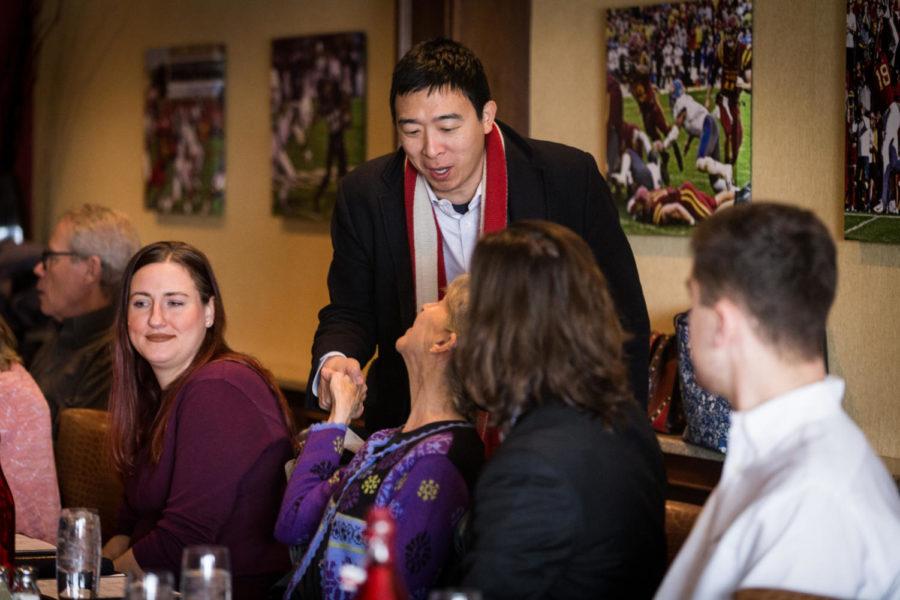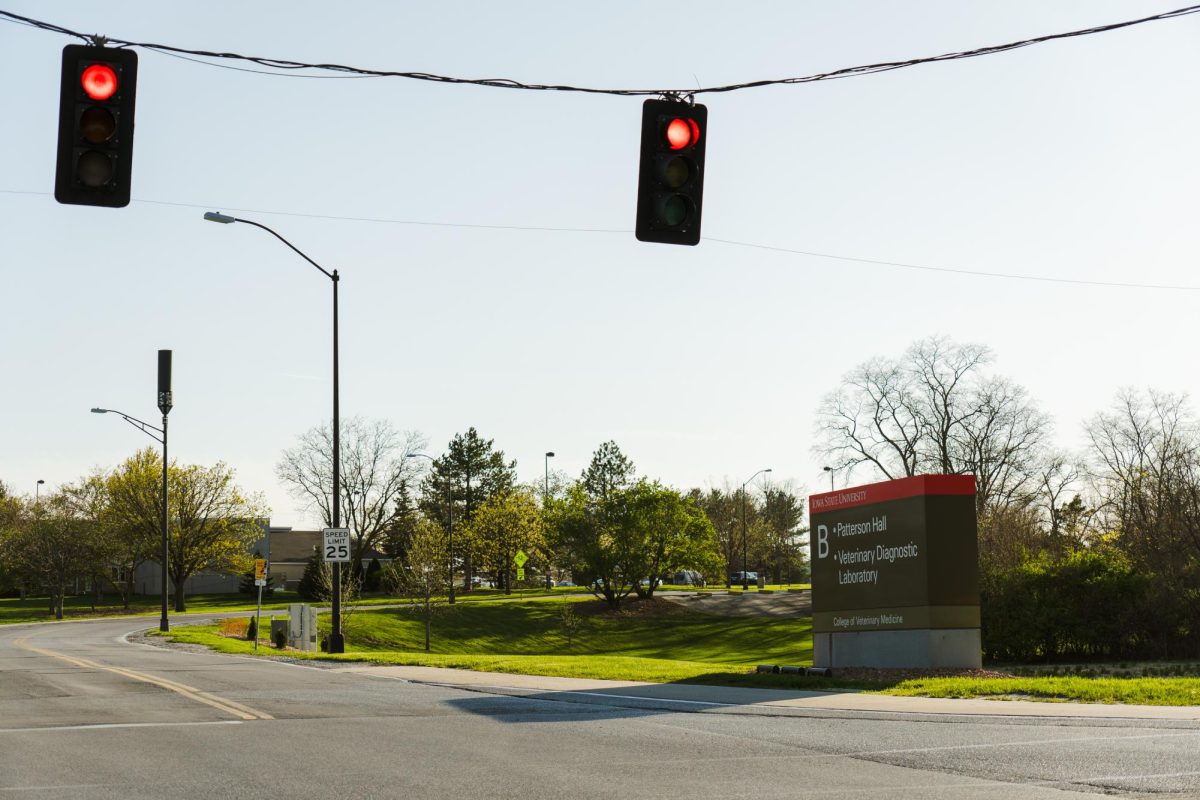Yang talks ‘human-centered capitalism’ with Story County Democrats
Mikinna Kerns/Iowa State Daily
Presidential hopeful Andrew Yang shakes hands with voters before the start of his luncheon with the Story Country Democrats held at the Iowa Stater Restaurant Jan. 31. Yang said that he wanted this lunch to be an opportunity for everyone to get to know him personally.
January 31, 2019
2020 Democratic presidential candidate Andrew Yang visited Ames Thursday to talk about his plan to give every American $1000 each month.
Yang, an entrepreneur, spoke to Story County Democrats at the Iowa Stater about the core elements of his campaign: a universal basic income, healthcare and investing in people, ideas which he has coined as “human-centered capitalism.”
Yang’s campaign is largely concerned with the effect of automation. He says America is currently in the “third inning of the greatest economic and technological transformation and the history of the world, and we’re not actually responding to it in a meaningful way.”
To alleviate the impacts of automation on the workforce, Yang has developed a policy for a universal basic income, which he branded as the “Freedom Dividend.”
“A universal basic income is a policy where everyone in the society gets a certain amount of money free and clear to do whatever they want, and my plan is $1000 a month,” Yang said. “Every adult, when you turn 18, you get $1000 a month.”
Story County Board of Supervisors Chair Lauris Olson said, in the context of losing jobs to automation, Ames has the lowest unemployment rate in the nation. According to the Bureau of Labor Statistics, Ames’ unemployment rate is 1.4 percent.
Yang said the model of employment is changing though and has shifted towards contract, temporary and “gig” jobs. While these jobs will put someone in the “employed” category, those people are often underemployed.
“I know Iowa has a very robust unemployment market,” Yang said. “I know your unemployment rate is some of the lowest in the country, but the headline unemployment rate masks a lot of ills. It masks the temp and gig and contractor jobs. It masks the affordability. It masks the fact that healthcare is breaking the backs of more and more families.”
Jessica Fears, an Ames resident experiencing unemployment, said Yang’s proposal would be a significant help to her family.
“I would fix my garage door. I would also fix my screen door because having an eleven-year-old, that’s wrecked,” Fears said. “I would be able to pay for my son’s sports and stuff instead of my parents paying for it. My father is a physician here in town, and I’m basically eternally indebted to him. Thankfully I have him though.”
Fears said she’s grateful to be able to rely on her parents through financial hardships, but she knows others who “haven’t been as lucky.”
Olson also said she has noticed an uptick in calls for “dramatic change”, such as a universal basic income, recently and is working to wrap her mind around these changes and their practicality.
“I’m hearing this new push for more radical change, and so I’m still trying to get used to it,” Olson said. “I’m a little older … I’m still trying to get used to it. Being a county supervisor, I’m still trying to wrap my mind around how do I take this information … and how do I bring change, knowing a lot of times change is a compromise.”
Yang said this idea does sound “too good to be true” for a lot of Americans but has been endorsed by public figures in the past.
Martin Luther King Jr. supported a guaranteed income in his book Where Do We Go From Here: Chaos or Community? and founding father Thomas Paine supported it as well in his pamphlet Agrarian Justice. A guaranteed income has also already been implemented in Alaska, funded by the oil industry.
Yang says his dividend would be funded by a “value-added tax” on major companies, which he says will be the main beneficiaries of automation.
Yang also discussed an “American scorecard” and healthcare as core tenants of his campaign.
Yang is married with two children and he discussed how his wife stays home to take care of their children, but the economic market doesn’t value her work even though it adds value to their family.
“We need to try and refocus our economy on things that would actually indicate how we are doing,” Yang said. “Because self-driving cars and trucks will be great for GDP but it’s going to be very very bad for many, many people and communities, so we need to measure our economy by how our communities are doing.”
Yang said those things would include quality of life measurements such as average income, life expectancy, “childhood success rates”, mental health and substance abuse rates and the proportion of the elderly who can retire in quality circumstances.
“You can build a composite scorecard and start driving economy in those ways,” Yang said. “The great thing there is you don’t even need an act of Congress. You just need an administration that’s like, ‘hey guys GDP’s a hundred years old, it’s time for an upgrade,’ and then you can start building in initially tax breaks and over time even more robust incentives to reward people who make communities stronger.”
Yang also advocates for Medicare for All as a part of his version of “human-centered capitalism
“It doesn’t make any sense to tie it to employment if employment is shifting in these ways,” Yang said.
While those are his biggest three policies, Yang said he has 77 more available on his website, yang2020.com
















